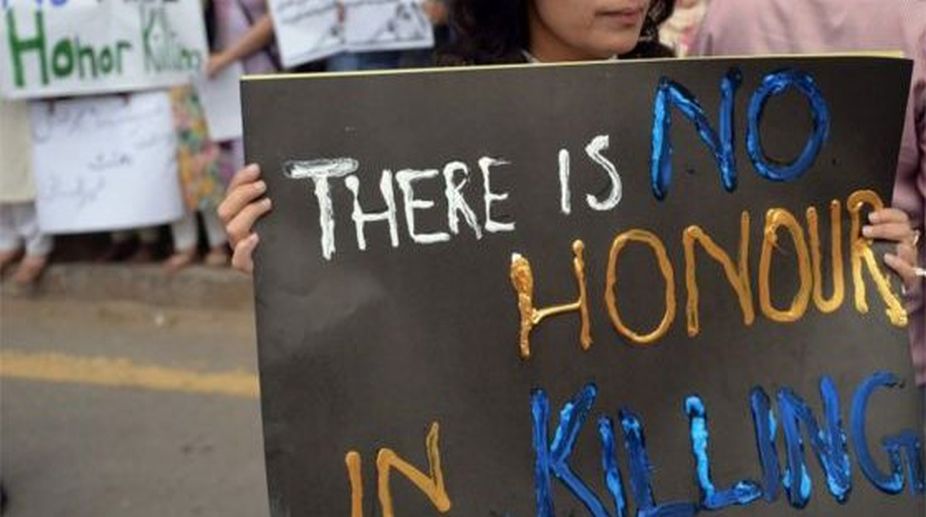Villagers protest over rape-murder of 5-year-old
Hundreds of villagers, primarily women, blocked the road connecting Falakata in Alipurduar district today to protest the alleged rape and murder of a five-year-old girl.

(Photo: Twitter)
In recent days, following a tip from a discreet informant, two bodies were exhumed from a graveyard in Sherpao Colony, Karachi. A post-mortem examination conducted thereafter revealed that the two individuals had been subjected to intense torture in their final hours: they had been beaten, tied to a charpai and electrocuted until they died, and then promptly buried under the cover of the night.
The bodies, it later transpired, belonged to two starcrossed lovers, both of them teenagers. As the police investigated further, it ended up unthreading the grisly details of a macabre tragedy. The young couple, it appears, had planned to elope, but before they could do so, their families found out. Initially, they decided to settle the matter amongst themselves, but a local jirga intervened, dismissed the settlement and ordered that the couple be killed instead.
The parents dutifully obeyed. And all honour lost, was apparently regained. If this sounds all too familiar, it is. This tragedy is as modern as it is ancient, as old as it is new.
Advertisement
It is a story that we have heard countless times before, only rephrased, restructured and reordered: characters come and go, but the plot remains unchanged. Murder in the name of honour has become a chronic pestilence in our society. We, in turn, have developed iron skins that seem to shield us from the true severity of this problem.
Part of the reason for this insulation is that these incidents are isolated, fleeting, and underreported; they briefly haunt our national psyche, until they are quickly exorcised and replaced with more sensationalist, ticker-worthy news. Part of the reason however, is that we continue to genuinely understate the sheer magnitude and scale of ‘honour’ killings. Let us put things into perspective. According to reports published by the Human Rights Commission of Pakistan, honour killings took 869 lives in 2013.
In 2014, this figure had jumped to 1,000 and in 2015, it edged even further up to 1,096. This means that every day at least two people in Pakistan are killed in the name of honour. If this is not staggering enough, let us also bear in mind that this is most likely a modest figure, since it is believed that a large number of honour killings remain unreported.
Notably, the Pakistani state, which had long been accused of silent complicity, has recently been spurred into action. Law enforcement agencies have discarded their previous sympathies and begun taking stricter action against the perpetrators.
Last year, parliament passed a momentous law, which not only classifies offences committed in the name or pretext of honour as fasad-fil-arz but also increases the maximum sentence for the crime to life imprisonment. Even the Council of Islamic Ideology has issued statements condemning this practice. Yet, despite these developments, honour killings are not merely continuing unabated, but as statistics indicate, they are rising in frequency.
At the heart of the persistence of this deplorable practice is its social and cultural acceptance. This acceptance is deeply linked with our long-standing prescription of an ancient, regressive and misogynistic notion of honour — one in which familial honour takes precedence over individual freedom, where honour is measured by the sexual chastity, piety and virtuosity of women, and where honour, if slighted, trumps even the sanctity of human life. In his book, The Honour Code, the renowned philosopher and cultural theorist, Kwame Anthony Appiah claims that morally abhorrent practices such as honour killing are difficult to eradicate through external appeals to reason, law or religion alone.
Instead, they can only be eliminated by bringing them into clear conflict with a society’s idea of honour, dignity and respect. Appiah proposes that rather than dismissing notions of honour as primitive or irrational, it is far more effective to harness their power by reshaping and reinventing honour codes, thereby turning them into a vehicle for social change.
“The respect, or disrespect, of our peers is an immensely powerful mechanism,” he says. “That is why honour — and its reciprocal sentiment, shame — is peculiarly well-suited to turn private conscience into public norms.” It is time to reimagine our conception of honour. In order to root out honour killing, we must make it ‘dishonourable’ to kill in the name of honour.
We must realise that the true battleground for the fight against this barbaric practice is not on the floor of legislative assemblies, but in the social and cultural fabric of our society, in the minds and hearts of our populace. Such a recreation of centuries-old ideas is not likely to be a small feat, for it requires us to dismantle existing hierarchies, discard feudal ethics and reexamine our familial and social structures.
The state must play an active part in this reconfiguration. It must adopt a holistic policy on both the regional and local levels, mobilising every resource at its disposal to create a nationwide campaign that specifically denounces this scourge. Similarly, political leaders, educationists and religious scholars, from every strata of our society, must be galvanised to unambiguously decry this practice. We must collectively and unequivocally, shame and condemn anyone who uses honour as an excuse or pretext to justify violence, and we must be heard loud and far.
For unless we do so, our stories will remain populated with the same protagonists — dead, star-crossed lovers. Postscript: It is bitterly ironic, but in the time that it took me to get acquainted with the gruesome murder of the teenage couple in Karachi, and to finish writing about them, a new incident of honour killing had already occurred in Peshawar, when a father killed both of his teenaged daughters as they attempted to flee his house.
Why? Allegedly, they were having ‘affairs’. The writer is a barrister and teaches constitutional law.
(Dawn/ANN)
Advertisement